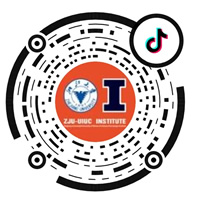On the morning of November 22, the Academic Forum on Technological Innovation and Systematic Reform for the "15th Five-Year Plan" was held at the Hainan International Convention and Exhibition Center in Haikou, Hainan Province.
The event was hosted by China Intelligent Transportation Systems Association and organized by Zhejiang University-University of Illinois Urbana-Champaign Institute (ZJUI) and Zhejiang Provincial Engineering Research Center for Multimodal Transport Logistics Large Models.

▲Prof. Lee Der-Horng chaired the forum
The forum was chaired by Prof. Lee Der-Horng, a Fellow of the Academy of Engineering Singapore, Qiushi Chair Professor at Zhejiang University, and Dean of ZJUI.
As a key academic event of the 20th Intelligent Transportation Systems China Congress 2025, the forum focused on major issues related to transportation technology innovation and system transformation during the upcoming 15th Five-Year Plan period. It brought together leading scholars in transportation engineering, systems science, and intelligent technologies to explore future trends and systemic reforms aimed at building a smarter, more efficient, and safer integrated transportation system.
Dr. Zhou Wei, former Chief Engineer of the Ministry of Transport (MOT) and Member of the MOT Expert Committee; Prof. Zhang Junyi, Foreign Member of the Engineering Academy of Japan (EAJ) and Distinguished Professor of Southeast University; Dr. Hou Dezao, Director of the Road Traffic Safety Center at the Research Institute of Highway of the Ministry of Transport (RIH-MOT); Prof. Chen Yanyan, Director of the Traffic Science and Technology Innovation Center and Director of the National Key Laboratory Cultivation Base for Traffic Engineering at Beijing University of Technology (BJUT); Prof. Tian Daxin, Deputy Dean of the Institute of Science and Technology and Director of the Frontier Innovation Department at Beihang University (BUAA); And Prof. Jin Jiangang, Professor at the School of Ocean and Civil Engineering of Shanghai Jiao Tong University (SJTU), along with other representatives from various universities, research institutions, and industry experts, attended the forum.
In his opening remarks, Prof. Lee Der-Horng extended a warm welcome to all participants, outlined the forum’s core objectives, and emphasized the vital role of technological innovation and systemic transformation in forging China’s new-quality transportation capabilities.

▲ Dr. Zhou Wei opened the session
Dr. Zhou Wei opened the session with a presentation titled “Strategic Planning for National-Level Comprehensive Transportation Innovation Platforms.” He outlined the strategic and industrial demands for comprehensive transportation innovation during the 15th Five-Year Plan period, highlighted gaps in infrastructure integration, digital-intelligent governance and system integration, and proposed a ministerial innovative framework, offering valuable insights for future transportation technology development.

▲Prof. Zhang Junyi presented a talk
Prof. Zhang Junyi followed with a talk entitled “From ITS to TIS: A Paradigm Shift from Intelligent Transportation Systems to Transportation Immune Systems.” Building on concepts from urban immunology, he noted that conventional ITS frameworks are increasingly inadequate for addressing complex mobility challenges. Instead, he introduced the “Transportation Immune System,” a next-generation model capable of sensing, diagnosing and adapting to issues such as congestion, safety risks, emissions, and system resilience.

▲ Dr. Hou Dezao offered a presentation
Dr. Hou Dezao offered a presentation on “AI-Driven Development in Road Traffic Safety.” He discussed how the convergence of digital technologies, intelligent mobility, and large-scale data is reshaping the field of road safety. He outlined an integrated safety framework encompassing human, vehicle, infrastructure, environment and governance dimensions, and demonstrated how AI technologies are enabling real-time risk detection, automated roadway inspections, and more efficient traffic network management.

▲ Prof. Chen Yanyan delivered a talk
Prof. Chen Yanyan delivered a talk titled “Enhancing Next-Generation Transportation Systems with AI.” She emphasized that the rapid rise of connected vehicles, autonomous driving, and large-scale data resources is ushering in a period of fundamental change for traditional transportation. Her presentation introduced an AI-enabled framework built around large models, multi-source perception, and intelligent agents, highlighting its tangible improvements in signal control, demand forecasting, dispatch coordination, and urban mobility governance.

▲ Prof. Tian Daxin presented his research
Prof. Tian Daxin presented his research under the theme “Fully Autonomous Driving in Complex Environments.” He examined the technical challenges that autonomous vehicles face in real-world operating conditions, including extreme weather, heterogeneous scenarios, and mixed traffic flows. His talk showcased advances in resilient 3D perception, predictive risk modeling, and adaptive control strategies, supported by case studies from ports, airports, and other high-complexity operational settings.

▲ Prof. Jin Jiangang delivered a presentation
Prof. Jin Jiangang delivered a presentation themed "Techno-Economic Optimization for Fleet Green Transition Toward Net-Zero Emissions." Noting the IMO’s emission reduction-driven energy restructuring in shipping, he proposed a "prediction-optimization" framework integrating main engine fuel consumption and route optimization models, addressing complex coupled multi-fuel, technology and operational strategy decisions. With real fleet cases, he demonstrated a green visual decision system, offering a low-carbon, efficient, sustainable solution for the industry.
In the forum's closing session, Prof. Lee Der-Horng shared insights on "Building an Air-Space-Ground Integrated Future Transportation and Logistics Paradigm" aligned with national strategic needs. He emphasized that amid the rapid development of the low-altitude economy, smart transportation and unmanned systems, single-field technological breakthroughs hardly meet diverse complex scenario demands, requiring a cross-disciplinary collaborative transportation ecosystem. He showcased his team's innovations in low-altitude-vehicle-road coordination, smart logistics/ports, and large models, proposing a "1+1+N" low-altitude innovation ecosystem and outlining a blueprint for transportation restructuring.

▲ Group photo
As a key academic platform for discussing transportation innovation and systemic transformation during the 15th Five-Year Plan period, the forum provided novel insights into smart mobility, traffic safety, system modernization, and green development. It also underscored ZJUI’s active role in advancing new-quality transportation capabilities and supporting the development of China’s transportation science and technology innovation system.
Looking ahead, ZJUI will continue to collaborate with universities and research institutions at home and abroad, enhance interdisciplinary collaboration, and deepen research in intelligent transportation, low-altitude economy, and integrated multimodal transportation systems, jointly exploring forward-looking, systematic, and sustainable development pathways for the future of transportation.







